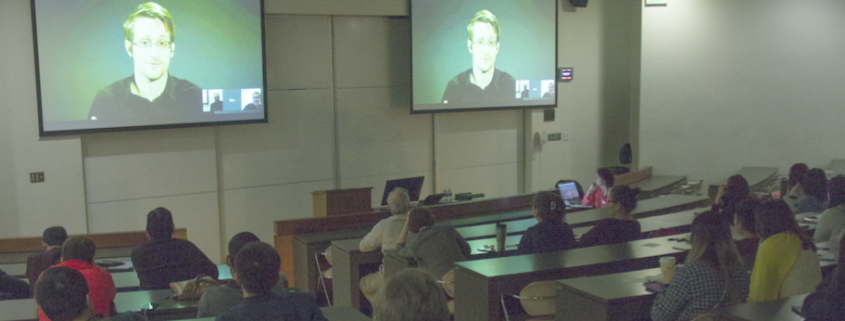Gould School of Law broadcasts livestream with Edward Snowden
Edward Snowden, a former NSA contractor accused of leaking classified government documents, and Barton Gellman, a Pulitzer Prize-winning author and journalist spoke during an interview that was broadcast live Saturday morning by the Gould School of Law. The interview was conducted in partnership with UC Irvine for a two-day symposium, “What Cannot Be Said, Freedom of Expression in a Changing World.”
The two-day event was timed to coincide with the first anniversary of the Charlie Hebdo attacks in Paris and features an in-depth examination of freedom of expression through various activities, including stand-up comedy and musical artistry.
Snowden began the interview by describing his military upbringing and his lost faith in the government.
“I grew up in the shadow of government. I was not radical. I was not skeptical. I signed up to join the army after we declared war in Iraq because I believed the government’s assertion that we were going to free the press. It was a just cause,” Snowden said. “My father worked in the military for 30 years. My grandfather was an admiral. My mother worked in the court systems.”
Snowden described his experience working for the NSA as unnerving. As he gained greater access within NSA ranks, he said that these national security programs were not what they claimed to be.
“In many cases, the primary uses of the tools that had been publicly justified as anti-terrorism tools were actually being used for something completely different,” Snowden said.
These programs were largely being used for foreign intelligence. Gellman brought the focus to college students and whether students and members of the younger generations should be concerned about government surveillance.
“Suppose they’re thinking, ‘Are there places I shouldn’t browse? Are there people I shouldn’t allow to friend me? Or jokes I shouldn’t tell? Or places I shouldn’t visit?’” Gellman said. “Would you advise them to be concerned about that?”
Snowden answered by explaining what information the federal government is storing.
“What the government describes as ‘bulk collection’ and everyone else on the planet describes as ‘mass surveillance’ means that every communication that can be intercepted and stored is being intercepted and stored,” Snowden said.
Both Snowden and Gellman went on to explain the concept of metadata to their student audience. Metadata was described as “the records of records” and how agencies can track your actions as opposed to digging through the content of your communications.
“Metadata, in the simplest context, means activity records. It means what you do and where you do it,” Snowden said. “It’s like a private eye; you’d notice if they were following you around. They can’t sit right behind you every time you go to a cafe, because you’ll probably notice this creepy guy.”
Gellman said that it is easier than ever to access data from handheld devices.
“Now the creepy guy is your iPhone or Android phone sitting in your pocket,” Gellman said.
Snowden presented a 2014 New York Review headline, “We Kill People Based On Metadata,” a direct quote from Gen. Michael Hayden, the former NSA director.
Gellman then segued into a conversation about the social media platform Snapchat.
“Everyone who’s using Snapchat for ‘interesting’ photos: It’s being deleted from that individual’s phone, but it’s still going through surveillance,” Snowden said. “You send a message to Snapchat, and they send it to someone else. They keep copies of these messages.”
Snowden drew applause from both USC and UC Irvine students when explaining the process of whistleblowing.
“There’s a step when you see too much, and you’re driven to action,” Snowden said. “We all have a moral imperative to find that point.”
Following the remarks from Gellman and Snowden, the interview was opened to the audience to ask questions for Snowden.
When asked about his lasting impression on the U.S. public, Snowden denied overt praise from those who may idolize him.
“I don’t like the word ‘hero’. I’m not a hero or a traitor, I’m just a citizen,” Snowden said.


Snowden – a hero of the highest order.
Please make this video interview available online, perhaps on YouTube.